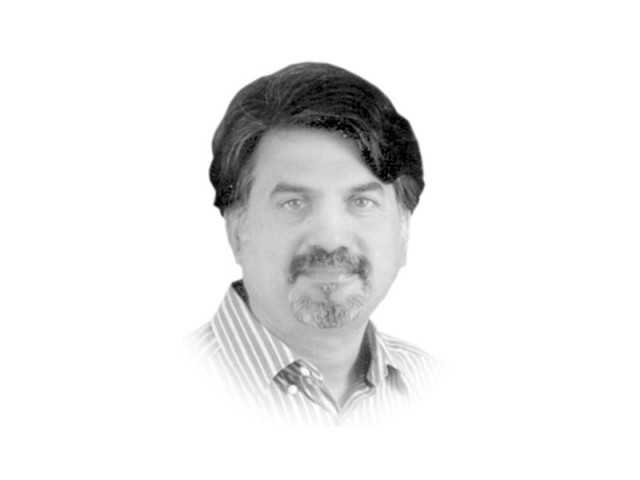Another tweeting president
The role of media and its effect on national security is being emphasised now for a very long time

The writer is a member faculty of contemporary studies at NDU Islamabad and can be reached at muhammadaliehsan1@hotmail.com
Afghanistan has been on the receiving end of the ‘violence perpetrated’ against countries like Afghanistan from a stand-off distance. Even today, the United States is spending $100 billion for expansion of intercontinental ballistic missile programme, including the building and induction of 666 new missiles. The United States unilaterally chose its ‘exclusivity’ and ‘exceptionalism’ to export violence to countries like Iraq and Afghanistan. If in the last 17 years, Afghanistan had been more consistent in showing ‘its serious concerns’ not to Pakistan but to the foreign occupation forces it might have forced the Americans to withdraw earlier. So the ‘seriously concerned Afghanistan government’ must first prepare itself to be answerable to the people of Afghanistan for the non-seriousness with which it treated the presence of foreign military boots on its ground and did little and nothing about it.
Seen at the global level, there are presently 50 conflict zones in the world and over 1.5 billion people permanently live under the threat of the violence. There are less inter-state threats and more sub-state threats that the ‘enforcers of order’ both at the global and state level confront. Obviously the world is witnessing the change of methods of confrontation from conventional to the non-conventional methods and politics, economics, informational and many other non-military measures are the tools being utilised to implement this method.
Locally, the law enforcers today confront ‘inescapable conditions’. The globalisation and the proliferation of the media has heightened the uncertainty and speed that confronts the law enforcers and their on the spot decision making. Their reluctance emboldens the protestors and troublemakers and as the protestors overpower and dominate the scene of action the law enforcers are at times forced to take actions that are not in line with the accepted norms. Law enforcers and the enforcers of order are mostly reacting and it is the other actors that now actually shape the security environment within which the law enforcers must act. Any event has to be decided by an action on the ground — it is by the law enforcer’s actions (taken or not taken) that the fate of event is decided. When faced with protests and demonstrations a state needs to act. If it is the proliferation and spread of an anti-state narrative and the participants of the gathering are encouraging the audiences to indulge in anti-state speeches and actions then both ways — by its action in the immediate context and lack and absence of it eventually results in destabilisation of the state.
A state also cannot afford to remain distracted by the political movements that are cropping up by the day. The enemies of the state exactly want this scenario and want the state to be bogged down handling the sub-state security challenges and thus not be able to pivot towards so many other security priorities. That non-military threats can destabilise the states in no time was theorised by General Valery Gerasimov, the Chief of Russian Army who fought the Chechnya’s war in 2012. He propagated that “thoroughly prosperous states in a matter of months or even days can turn into an arena of fierce armed struggle.” President Putin of Russia did take that advice and his subsequent actions in Ukraine in 2014 are reflective of application of General Gerasimov’s theory.
The role of media and its effect on national security is being emphasised now for a very long time. The public needs to be educated and provided with the relevant context to be able to develop the ability to place the facts in their actual framework. Movements such as the Pashtun Tahaffuz Movement (PTM) take advantage of the freedoms that democracy protects and provides and manages to arrange political gatherings, but when it indulges in anti-state speech-making in the same political gatherings and the state responds by curbing some freedoms like preventing the media from showcasing their ‘anti-state stunts’, why should the state be considered ‘violent’ and the hate and anti-Pakistan speechmakers ‘peaceful’. The injury or deaths that result due to the clash with the security forces are a consequence of peculiarities of any given event. Those must be investigated but besides the state movements like the PTM and their leadership must also exercise caution and not see maximising the movement’s spread on the slogan that ‘if it bleeds it leads’.
How much is the importance of understanding the context in the sub-state threats and warfare that we are engaged in can be judged from how the facts are usually not checked and twisted by the media. For example, Glenn Beck a commentator on FOX News said in a radio programme in 2010 that at least 10% of all Muslims were acting as terrorists. There was no fact-checking and millions heard his statement. When Fareed Zakaria asked a terrorism analyst on CNN whether the assessment was accurate, he replied that it was off by one thousand per cent — 10% at that time meant 157 million people.
Lastly, President Ghani may say and tweet what he may, the State of Pakistan will do what it must and it will to protect its unity and sovereignty.
Published in The Express Tribune, February 10th, 2019.
Like Opinion & Editorial on Facebook, follow @ETOpEd on Twitter to receive all updates on all our daily pieces.















COMMENTS
Comments are moderated and generally will be posted if they are on-topic and not abusive.
For more information, please see our Comments FAQ